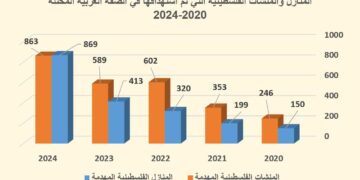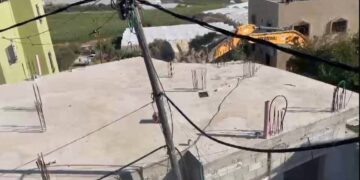- Violation: demolishing houses
- Location: Al-Walaja village- Bethlehem
- Date: May 04, 2017
- Perpetrators: Israeli Occupation Forces
- Victims: four Palestinian families
Details:
Israeli Occupation Forces demolished on May 04, 2017 four residences in the area of Ein Jweiza in Al-Walaja village on the claim of "unlicensed construction" within the borders of Jerusalem municipality. Despite that fact that the affected owners hired an attorney to follow up on the residences' case before demolition, Israel Supreme Court eventually ordered them demolished.
As a result, kids and women were left traumatized and now await for the uncertain future since they became homeless.
It should be noted that Al-Walaja village is facing a critical security situation. An Israeli court issued an order to modify and complete the construction of the apartheid wall, which as a matter of fact, surrounds the village from all directions. Many residents got their structures demolished while others had their lands confiscated for the favor of colonial expansionist plans.
The following table shows information about the affected owners of houses:
|
Affected citizen |
Family |
No. of floors |
Are of structure\m2 |
Construction cost |
|
Ibrahim Nairoukh |
6 |
2 |
240 |
|
|
Hamid Abu Sunaina |
7 |
1 |
110 |
300,000 NIS |
|
Raed Abu Sunaina |
6 |
1 |
110 |
300,000 NIS |
|
Wael Hmeida |
7 |
2 |
280 |
500,000 NIS |
|
Total |
26 |
6 |
740 |
|
Source : Field observation- Department of Monitoring Israeli Violations- Land Research Center2017
Photos 1-4: views of the destructed houses
- Al Walaja:
5 kilometer northwestern Ramallah, Al Walaja is surrounded by Battir (west), Sharafat (east), and Beit Jala (south).
Al Walaja has a total population of 2041 people according to statistics conducted in 2007. It has a total area of 4327 of which 446 dunums are a built-up area of the village.
The Israeli occupation devoured 155 dunums of the lands of the village for two colonies:
- Har Gilo: it was built in 1972 and confiscated 104 dunums of the village. It is inhabited by 365 colonists.
- Gilo: it was built in 1981 and devoured 51 dunums. It is inhabited by 27569 colonists.
Moreover, bypass number 436 took over 246 dunums of the village lands. Also, the Apartheid Wall damaged 69 dunums and is expected to isolate 4171 other dunums from the area. The length of the wall built on Al Walaja lands is 6942 meters.
According to Oslo Accords, 3% of Al Walaja is under Area B (PA is in charge of civil matters with Israel responsible for security). However, most of the village lands (97%) is under Area C (Israel maintains full security and administrative control). Here are the area in dunums:
- Area B (115) dunums
- Area C (4056) dunums
Land Research Center LRC sees that demolitions contradict with all of the International conventions and Humanitarian laws including:
- Article 17 of the (1948) Universal Declaration of Human Rights stating: “Everyone has the right to own property alone as well as in association with others. No one shall be arbitrarily deprived of his property.”
- Section ‹G› of article 23 of the (1907) The Hague Conventions asserting: “In addition to the prohibitions provided by special Conventions, it is especially forbidden to destroy or seize the enemy's property, unless such destruction or seizure be imperatively demanded by the necessities of war.”
- Article 53 of the Geneva Fourth Convention (1948) declaring: “Any destruction by the Occupying Power of real or personal property belonging individually or collectively to private persons, or to the State, or to other public authorities, or to social or cooperative organizations, is prohibited, except where such destruction is rendered absolutely necessary by military operations.”
- Section 1, Article 11 of the International Covenant on Economic, Social and Cultural Rights (1966): “The States Parties to the present Covenant recognize the right of everyone to an adequate standard of living for himself and his family, including adequate food, clothing and housing, and to the continuous improvement of living conditions. The States Parties will take appropriate steps to ensure the realization of this right, recognizing to this effect the essential importance of international co-operation based on free consent."
Prepared by
The Land Research Center
LRC
















